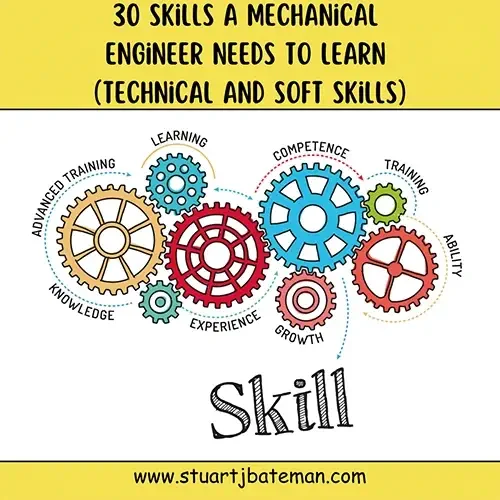30 Mechanical Engineering Skills you need to learn now to kick start your career (Technical and Soft skills)

If you don’t love something you won’t go the extra mile – Steve Jobs
Mechanical engineering skills we can all rely on
Here’s a question that we can really get stuck into and get some tangible answers (with sources), let’s explore the 30 essential Mechanical engineering skills that every mechanical engineer should develop for a successful and rewarding career. Whether you’re a seasoned professional looking to refine your abilities or a budding engineer eager to learn, this guide is tailored for you.
So, I’ve been thinking about this for about a month, and I wanted to add my 2 cents as a Chartered Engineer, passing on the pearls of wisdom to the next in line, so diving into research I present to you the 30 skills (technical and soft) that I believe a mechanical (or any engineer) should develop.
While I could go into each skill, I’ve found sites that really go in depth for you to read up and bookmark, enjoy!
Soft mechanical engineering skills:
- Communication Skills (Interpersonal, Group Talking, Presentation)
- Importance in project discussions, client interactions, and team collaborations.
- Source: https://www.indeed.com/
- Problem Solving
- Emphasizing the role of critical thinking in addressing engineering challenges.
- Source: https://www.linkedin.com/
- Leadership
- How leadership skills contribute to effective project management.
- Source: leadership-skills
- Teamwork
- Discussing the collaborative nature of engineering projects.
- Source: https://your.yale.edu/
- Critical Thinking (First Principles)
- Applying first principles thinking in engineering problem-solving.
- Source: the-importance-of-critical-thinking
- Optimization
- Integrating optimization techniques for efficient engineering solutions.
- Source: why-optimization-important-techniques-big-data-varun-pandian
- Attention to Detail (Adaptable/Resilient)
- The role of precision and adaptability in project execution.
- Source: why-attention-detail-important-natasha-barker-oly
- Writing Technical Reports
- Enhancing communication through clear and concise technical writing.
- Source: academic-skills
- Budgeting (Costing, ROI)
- Managing project finances and understanding return on investment.
- Source: importance-of-budgeting-in-business
- Innovative Thinking
- Encouraging engineers to explore new approaches.
- Source: importance-creative-thinking-our-life-tonderai-giftrice-magaya
- Time Management
- Ensuring efficient project timelines.
- Source: the-power-of-effective-time-management
- Active Learning
- Continuous learning for staying updated in the dynamic field of engineering.
- Source: active-learning
Technical mechanical engineering skills:
- Creativity in Engineering (Technical)
- Leveraging creativity in technical aspects.
- Source: Unit_1:_Creativity_and_its_Importance_in_Engineering
- Project Management (Critical Path Analysis)
- Utilizing project management tools for efficient execution.
- Source: importance-project-management-engineering-bilal-malik
- Mathematical Skills (Calculus, Algebra, Statistics, Geometry, Trigonometry)
- The foundation of engineering calculations.
- Source: maths-need-engineer-15155.html
- CAD (2/3D) and FEA
- The role of computer-aided design and analysis.
- Source: importance-cad-modeling-mechanical-engineers-gurusamy
- Coding (VBA, Python)
- Integrating programming skills in engineering tasks.
- Source: importance-coding-mechanical-engineering-yash-mitra
- Drawing/Designing (Geometric Tolerances, BS 8888, DFMEA)
- Precision in design and adherence to standards.
- Source: importance-drawing-stuff-mechanical-engineers-gurusamy
- Analytical Analysis (Root Cause Analysis)
- Identifying and addressing the root causes of engineering issues.
- Source: problem-solving-analytical-skills
- Science and Technology Knowledge (Thermodynamics, Fluid Mechanics, Statics and Kinematics)
- Core principles for understanding mechanical systems.
- Source: technologys-relationship-with-engineering-and-management
- Research Skills
- Conducting effective engineering research.
- Source: ResearchSkillsForEngineeringStudents
- Testing and Evaluating
- Importance of rigorous testing in engineering.
- Source: test-engineering
- MS Office (Excel, Word, Power BI, Access)
- Harnessing the power of Microsoft Office for engineering tasks.
- Source: Is-learning-MS-office-important-for-a-mechanical-engineer
- Material Science (Heat Treatments)
- Understanding the properties of materials.
- Source: what-mse
- Manufacturing Processes (Lathe, Mill, CNC, Bending, Welding, Grinding, Finishing)
- Hands-on skills for producing tangible engineering solutions.
- Source: why-manufacturing-is-vital-to-engineering-education
- Measuring (Shadowgraphs, Hardness Testing, Vernier Calipers, Micrometers, DTIs, Depth Gauge, Slips, Ring/Thread Gauges)
- Precision measurement techniques in engineering.
- Source: What-is-the-importance-of-measurement-in-engineering
- Instrumentation and Control (Servo Motors, LCD Screens)
- Understanding and implementing control systems.
- Source: importance-instrumentation-control-engineering-plant-taaltech
- Control Systems
- Designing and implementing control systems.
- Source: importance-control-systems-modern-world-divyabanu-divya
- Robotics
- The role of robotics in modern mechanical engineering.
- Source: What-is-the-importance-of-robotics-in-engineering
Conclusion
In conclusion, mastering the diverse set of skills outlined in this guide is not just a checklist but a roadmap to becoming an exceptional mechanical engineer. The combination of technical prowess and soft skills will not only open doors to exciting opportunities but also elevate your contributions to the field. Remember, continuous learning and application of these skills are the keys to sustained success in the dynamic world of mechanical engineering.
Internal (Resources) – Engineering Mindset
It’s great to develop the skills required for an engineering career, but you need to develop you mindset in order to tackle complex engineering problems, for that I recommend the following articles:
- How to overcome your assumptions
- How I sharpen the saw
- How to detect biases with these tools
- How to use first principle thinking like Elon
- How to use Critical thinking
References:
- https://www.naukri.com/blog/15-skills-to-become-a-mechanical-engineer
- https://www.liveabout.com/list-of-mechanical-engineer-skills-2062433
- https://www.prospects.ac.uk/job-profiles/mechanical-engineer
- https://targetjobs.co.uk/careers-advice/job-descriptions/mechanical-engineer-job-description
- https://nationalcareers.service.gov.uk/job-profiles/mechanical-engineer
- https://uk.indeed.com/career-advice/career-development/mechanical-engineer-skills
- https://www.thermodyneboilers.com/mechanical-engineer-skills-list
- https://mechanicalc.com/posts/mechanical-engineering-skills
- https://www.nesta.com.hk/13-technical-skills-for-mechanical-engineers
- https://www.twi-global.com/technical-knowledge/faqs/what-is-a-mechanical-engineer#KnowledgeandSkills
- https://skill-lync.com/blogs/technical-blogs/5-essential-skill-sets-for-a-mechanical-engineer
- https://www.linkedin.com/pulse/10-skills-every-mechanical-engineer-should-have-vaitheeswaran-v
- https://www.asme.org/topics-resources/content/12-skills-need-advance-career-part-1
- https://apps.illinoisworknet.com/cis/clusters/OccupationDetails/100123?parentId=111500§ion=skills§ionTitle=Skills%20and%20Abilities
- https://www.mtu.edu/mechanical/engineering
- https://skill-lync.com/blogs/top-skills-you-need-as-a-mechanical-engineer-to-boost-your-career-opportunities
- https://www.imperial.ac.uk/careers/plan-your-career/what-can-i-do-with-my-degree/mechanical-engineering



What are your thoughts? Have I covered everything or is there more you know and would like to share?
I’m always learning and improving this site and my blogs, so please feel free to get in touch with me via LinkedIn or this site to discuss any topics I have covered.
If you’re having trouble finding ways to progress check out these sites filled with free learning tools:


